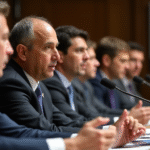Introduction
Mexican magnate Fernando Chico Pardo has purchased a quarter of Banamex, completing a multi-pronged move that benefits various stakeholders.
Key Aspects of the Acquisition
- Unraveling the Banamex Sale: Chico Pardo’s acquisition resolved the ongoing sale operation of Banamex, announced by Citi since 2022.
- Elevated Institution Value: The deal increased Banamex’s estimated value to approximately $9.2 billion.
- Mexican Investor Prestige: Banamex now falls under the control of a reputable Mexican investor.
- Boost for Sheinbaum’s Government: The acquisition provides a much-needed breath of fresh air for Claudia Sheinbaum’s government, crucial in reviving domestic and international private investment.
- OPI Impulse: Chico Pardo’s purchase is expected to significantly bolster the upcoming Initial Public Offering (OPI).
Chico Pardo’s Confidence in Mexico
Fernando Chico Pardo, through his recent press conference, expressed confidence in Mexico’s future under President Claudia Sheinbaum’s leadership. He emphasized his long-standing success in Mexican investments over the past five decades.
Despite political uncertainties surrounding the rule of law and the country’s economic situation, Chico Pardo remains optimistic about Mexico’s potential. His investment signifies a collective win for all involved parties.
Medicines Procurement Challenges
Seven years into the so-called Fourth Transformation, medicine procurement and supply in public health institutions remain a significant issue.
During the previous administration, medicine procurement turned into a series of failures, culminating in escalated acquisition costs, direct allocations over reverse auctions, and most critically, medicine shortages.
As the first year of President Claudia Sheinbaum’s term approaches, medicine procurement continues to pose a massive challenge.
Recently, Sheinbaum and Subsecretary of Integration and Development of the Health Sector, Eduardo Clark, accused around thirty pharmaceutical companies of failing to deliver assigned medicines, causing hospital and clinic shortages.
These companies were given an ultimatum to deliver the medicines or face ineligibility for future public tenders.
Sheinbaum stressed that outstanding debts to the pharmaceutical industry do not justify non-compliance.
From the private sector, Canifarma president Rafael Gual, while avoiding confrontation, affirmed that pharmaceutical companies have fulfilled their medicine delivery obligations.
Gual pointed out that only three of the thirty accused companies are Canifarma members, and he identified just five companies as genuine pharmaceutical manufacturers or holders with health registrations.
He also mentioned discrepancies between publicly announced figures and assigned quantities. Moreover, Gual highlighted that the government owes the industry $14 billion from 2023 to 2025.
The lack of clear leadership in medicine procurement among Secretariat of Health, Birmex, and IMSS Bienestar has led to numerous processes with varying schemes since the last major tender.
The persistent medicine shortages and insufficient hospital infrastructure investment are palpable realities.
Key Questions and Answers
- What is the significance of Fernando Chico Pardo’s Banamex acquisition? Chico Pardo’s purchase resolves the ongoing Banamex sale, elevates its value, places it under a reputable Mexican investor, supports Sheinbaum’s government, and boosts the upcoming OPI.
- Why is medicine procurement in Mexico a challenge? Despite past and ongoing efforts, medicine procurement in Mexico has been marred by failures, escalating costs, and shortages, with disputes between the government and pharmaceutical companies persisting.






